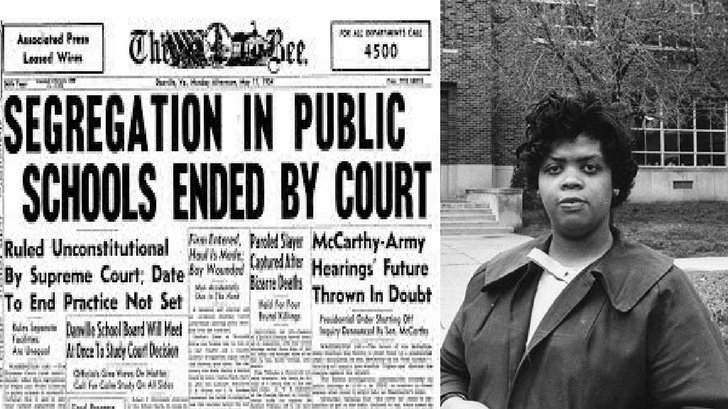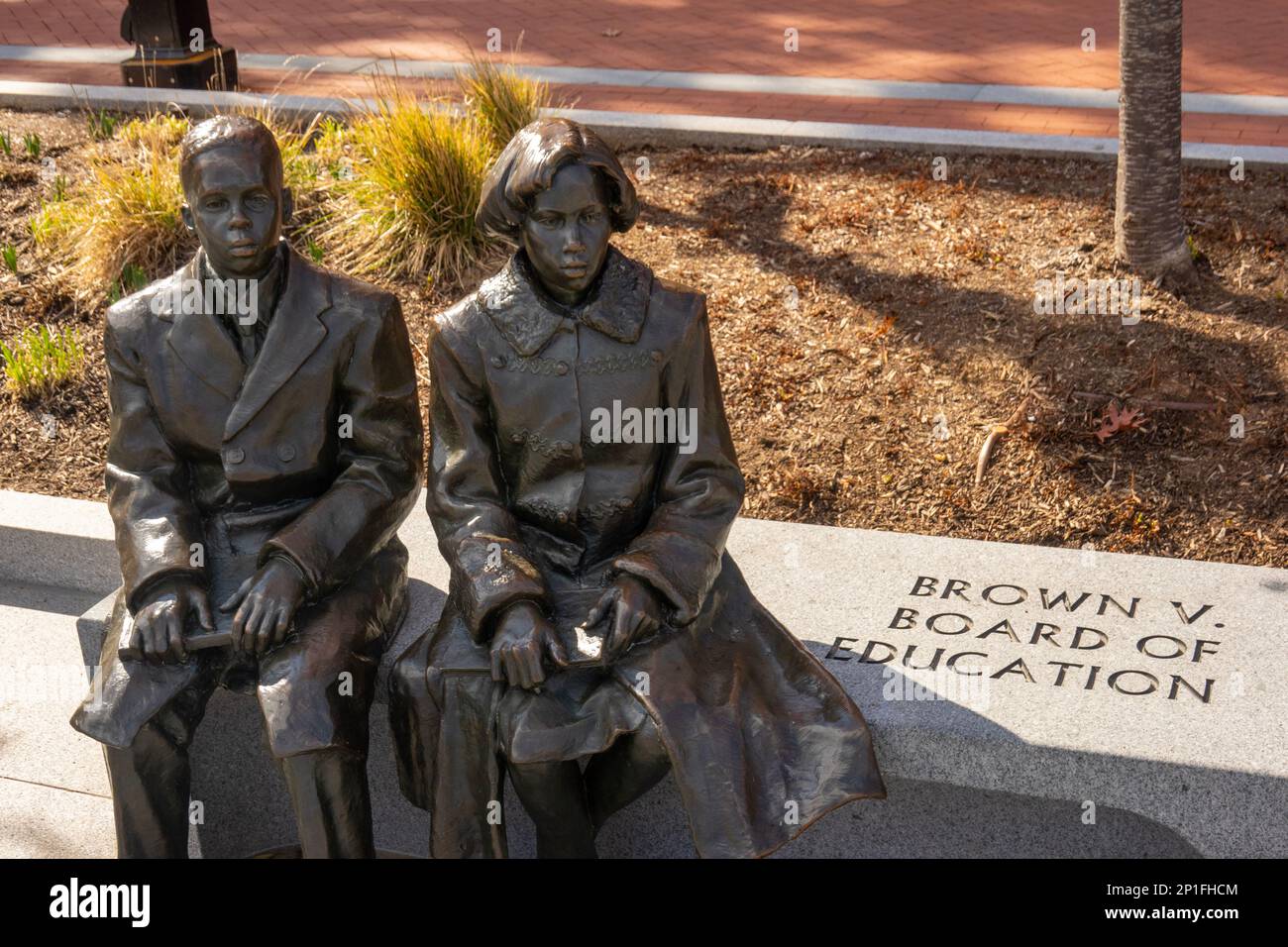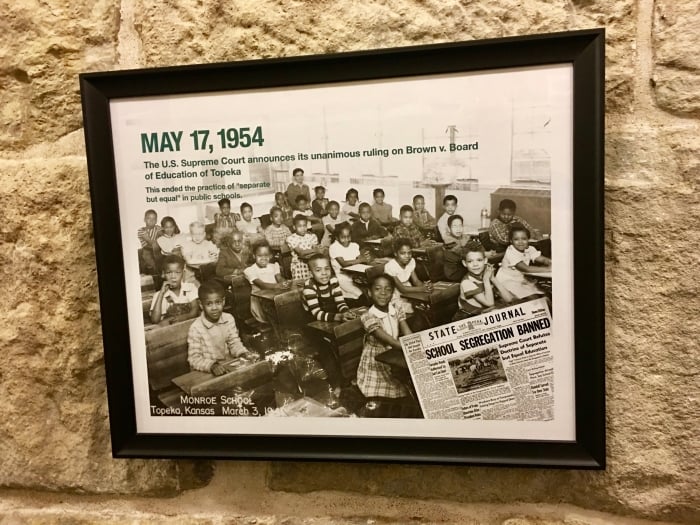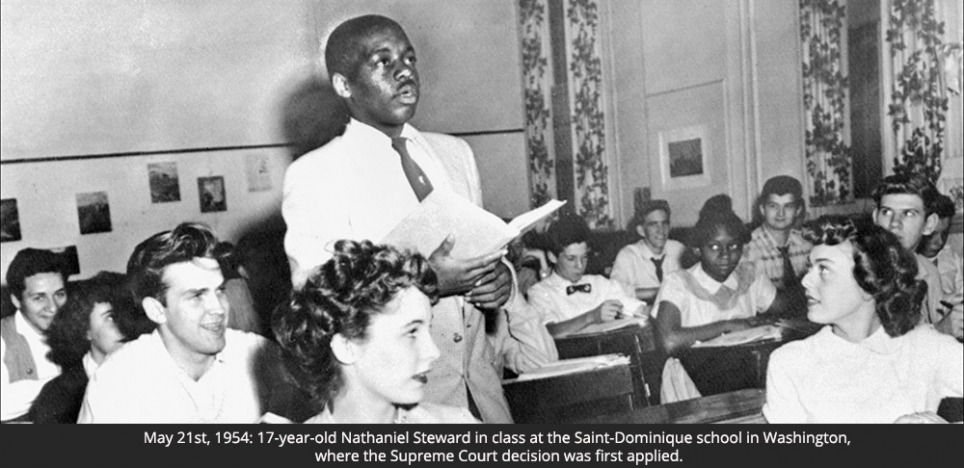U.S. Supreme Court. Brown v. Board of Education of Topeka, 347 U.S. 483 (1954) Brown v. Board of Education of Topeka Argued December 9, 1952 Reargued December 8, 1953 Decided May 17, 1954* APPEAL FROM THE UNITED STATES DISTRICT COURT FOR THE DISTRICT OF KANSAS MR. CHIEF JUSTICE WARREN delivered the opinion of the Court.
Brown v. Board of Education of Topeka | Teaching American History
The 1954 United States Supreme Court decision in Oliver L. Brown et al v. the Board of Education of Topeka (KS) et al. is among the most significant judicial turning points in the development of our country. Originally led by Charles H. Houston, and later Thurgood Marshall and a formidable legal team, it dismantled the legal basis for racial segregation in schools and other public facilities.

Source Image: m.facebook.com
Download Image
Brown v. Board of Education of Topeka, Kansas. Brown (347 U.S. 483 [1954]) was the most important legal case affecting African Americans in the twentieth century and unquestionably one of the most important Supreme Court decisions in U.S. constitutional history. Although directly involving segregated public schools, the case became the legal

Source Image: towncentervb.com
Download Image
Topeka Kansas Civil Rights History: 5+1 Key Sites | Backroad Planet The Supreme Court’s opinion in the Brown v. Board of Education case of 1954 legally ended decades of racial segregation in America’s public schools. Chief Justice Earl Warren delivered the unanimous ruling in the landmark civil rights case. State-sanctioned segregation of public schools was a violation of the 14th Amendment and was therefore unconstitutional. This historic decision marked the

Source Image: amazon.sg
Download Image
Brown V Board Of Education Of Topeka Kansas Judicial Review
The Supreme Court’s opinion in the Brown v. Board of Education case of 1954 legally ended decades of racial segregation in America’s public schools. Chief Justice Earl Warren delivered the unanimous ruling in the landmark civil rights case. State-sanctioned segregation of public schools was a violation of the 14th Amendment and was therefore unconstitutional. This historic decision marked the Brown v. Board of Education of Topeka (1954) 347 U.S. 483 (1954) Justice Vote: 9-0. Majority: Warren (author), Black, Reed, Frankfurter, Douglas, Jackson, Burton, Clark, Minton. More in The Constitution. Share. “We conclude that in the field of public education the doctrine of ‘separate but equal’ has no place.
Brown V. Board of Education of Topeka: Challenging School Segregation in the Supreme Court : Miller, Jake: Amazon.sg: Books
In Brown v. Board of Education of Topeka (1954) a unanimous Supreme Court declared that racial segregation in public schools is unconstitutional. The Court declared “separate” educational facilities “inherently unequal.”. The case electrified the nation, and remains a landmark in legal history and a milestone in civil rights history. Brown V Board Of Education 1 And 2 2024 | towncentervb.com

Source Image: towncentervb.com
Download Image
Brown v board of education hi-res stock photography and images – Alamy In Brown v. Board of Education of Topeka (1954) a unanimous Supreme Court declared that racial segregation in public schools is unconstitutional. The Court declared “separate” educational facilities “inherently unequal.”. The case electrified the nation, and remains a landmark in legal history and a milestone in civil rights history.

Source Image: alamy.com
Download Image
Brown v. Board of Education of Topeka | Teaching American History U.S. Supreme Court. Brown v. Board of Education of Topeka, 347 U.S. 483 (1954) Brown v. Board of Education of Topeka Argued December 9, 1952 Reargued December 8, 1953 Decided May 17, 1954* APPEAL FROM THE UNITED STATES DISTRICT COURT FOR THE DISTRICT OF KANSAS MR. CHIEF JUSTICE WARREN delivered the opinion of the Court.

Source Image: teachingamericanhistory.org
Download Image
Topeka Kansas Civil Rights History: 5+1 Key Sites | Backroad Planet Brown v. Board of Education of Topeka, Kansas. Brown (347 U.S. 483 [1954]) was the most important legal case affecting African Americans in the twentieth century and unquestionably one of the most important Supreme Court decisions in U.S. constitutional history. Although directly involving segregated public schools, the case became the legal

Source Image: backroadplanet.com
Download Image
Six Resources That Look at the History and Legacy of Brown v. Board of Education | Blog | Share My Lesson The combined cases became known as Oliver L. Brown et. al. vs. The Board of Education of Topeka, et. al. On May 17, 1954 at 12:52 p.m. the United States Supreme Court issued a unanimous decision that it was unconstitutional, violating the 14th amendment, to separate children in public schools for no other reason than their race. Brown vs.

Source Image: sharemylesson.com
Download Image
Amazon.com: Knowledge Unlimited Inc. Brown v. Board of Education, Topeka KS – Landmark Decisions of The Supreme Court Poster: Prints: Posters & Prints The Supreme Court’s opinion in the Brown v. Board of Education case of 1954 legally ended decades of racial segregation in America’s public schools. Chief Justice Earl Warren delivered the unanimous ruling in the landmark civil rights case. State-sanctioned segregation of public schools was a violation of the 14th Amendment and was therefore unconstitutional. This historic decision marked the

Source Image: amazon.com
Download Image
Anniversary of Brown v Board of Education and the End of Segregated Schools | Naming the Days | Spirituality & Practice Brown v. Board of Education of Topeka (1954) 347 U.S. 483 (1954) Justice Vote: 9-0. Majority: Warren (author), Black, Reed, Frankfurter, Douglas, Jackson, Burton, Clark, Minton. More in The Constitution. Share. “We conclude that in the field of public education the doctrine of ‘separate but equal’ has no place.

Source Image: spiritualityandpractice.com
Download Image
Brown v board of education hi-res stock photography and images – Alamy
Anniversary of Brown v Board of Education and the End of Segregated Schools | Naming the Days | Spirituality & Practice The 1954 United States Supreme Court decision in Oliver L. Brown et al v. the Board of Education of Topeka (KS) et al. is among the most significant judicial turning points in the development of our country. Originally led by Charles H. Houston, and later Thurgood Marshall and a formidable legal team, it dismantled the legal basis for racial segregation in schools and other public facilities.
Topeka Kansas Civil Rights History: 5+1 Key Sites | Backroad Planet Amazon.com: Knowledge Unlimited Inc. Brown v. Board of Education, Topeka KS – Landmark Decisions of The Supreme Court Poster: Prints: Posters & Prints The combined cases became known as Oliver L. Brown et. al. vs. The Board of Education of Topeka, et. al. On May 17, 1954 at 12:52 p.m. the United States Supreme Court issued a unanimous decision that it was unconstitutional, violating the 14th amendment, to separate children in public schools for no other reason than their race. Brown vs.